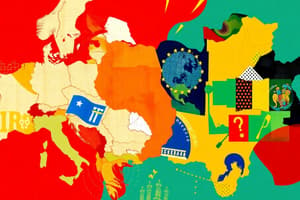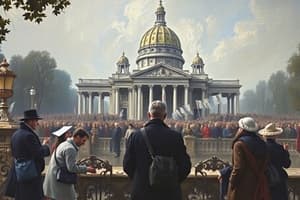Podcast
Questions and Answers
Define government.
Define government.
A government is the governing authority of a political unit.
Which of the following are roles/functions of government? (Select all that apply)
Which of the following are roles/functions of government? (Select all that apply)
- Regulating social media
- Education and healthcare (correct)
- Military defense (correct)
- Economic development (correct)
Autocracy allows mass participation through political parties and pressure groups.
Autocracy allows mass participation through political parties and pressure groups.
False (B)
In a democratic government, the power of the central government is limited and regulated by the law and separation of powers among the executive, legislature, and ______.
In a democratic government, the power of the central government is limited and regulated by the law and separation of powers among the executive, legislature, and ______.
Match the types of government with their descriptions:
Match the types of government with their descriptions:
What is the primary focus of political science?
What is the primary focus of political science?
What is the main characteristic of a 'lab' in the context of political science?
What is the main characteristic of a 'lab' in the context of political science?
Which approach to the study of politics deals with political ideas and asks normative questions?
Which approach to the study of politics deals with political ideas and asks normative questions?
What is the primary goal of studying political science?
What is the primary goal of studying political science?
What is the key characteristic of the approach to the study of politics that involves examining the empirical data?
What is the key characteristic of the approach to the study of politics that involves examining the empirical data?
What is the primary focus of public choice theory?
What is the primary focus of public choice theory?
What is the significance of the rule of thumb in the study of politics?
What is the significance of the rule of thumb in the study of politics?
What is the outcome of studying political science?
What is the outcome of studying political science?
What is the relationship between political science and the physical world?
What is the relationship between political science and the physical world?
What is the primary difference between political philosophy and political behavior?
What is the primary difference between political philosophy and political behavior?
Study Notes
Government and Governance
- Government: "the organisation, that is the governing authority of a political unit"
- Governance: "the exercise of political authority and the use of institutional resources to manage society's problems and affairs"
- The state cannot exist without a government, and the government is created to enforce rules of conduct and ensure obedience
Three Organs of Government
- Legislature: enacts the general rules of society, including law-making, representation, supervision, financial, electoral, judicial, and inquest functions
- Executive: responsible for the execution of the policies of the state, including internal administration, external administration, military functions, legislative functions, and judicial functions
- Judiciary: ensures administration of justice, including establishing facts, interpreting laws, creating laws, upholding the constitution, preventing violation of law, and judicial review
Separation of Power
- Separation of powers involves separating governmental powers into three arms of government: legislature, executive, and judiciary
- Purpose: to protect liberty, with each arm performing separate functions and staffed by different people
Roles/Functions of Government
- Economic:
- Transfer of resources: collecting tax, providing subsidies, and developing socio-economic infrastructure
- Provision of subsidies: easing the burden of the needy, increasing investment/business opportunities, and developing the economy
- Social:
- Education: early, primary, secondary, and tertiary education, as well as social security and inter-ethnic relations
- Healthcare: building hospitals, clinics, and ensuring the well-being of people in general
- Political:
- Administration: ministry, municipalities, etc.
- Regulation: law and order, diplomatic affairs, and defense policy
- Foreign affairs: diplomatic affairs, security of the nation at large, and military functions
Types of Government
- Federal:
- Definition: a system of government with two sets of governments, national and constituent units, with division of power laid out by the constitution
- Advantages: capable of uniting different units, preserving local uniqueness, and including many cultural and political units
- Disadvantages: duplication of services, difficulty in amending the constitution, and state consent
- Unitary:
- Definition: a system of government with sovereign power residing in the central and national government
- Advantages: uniform application of laws and policies, simple government, and little or no duplication of personnel and services
- Disadvantages: local units could be neglected, and not suitable for large and heterogeneous nations
- Presidential:
- Definition: a system of government with the chief executive, the president, elected for a fixed term and independent of the legislature
- Characteristics: responsibility vested in the president, executive directly responsible to the electorate, and president appoints heads of departments
- Republic:
- Definition: a state not led by a hereditary monarch, with people having an impact on the government
- Characteristics: head of state is called president, and people have an impact on the government
- Autocratic:
- Definition: a system of government with power held by a single self-appointed leader/ruler, with ordinary people usually not having a great deal of personal freedom
- Characteristics: no dominating political ideology, resorts to force and coercion, and weak civil liberty
- Totalitarian:
- Definition: a system of government with social life regulated by the government, economy controlled by the government, and no market forces
- Characteristics: only one party considered as politically and legally legal, judiciary and mass media controlled by the government, and criticisms on the government not allowed
- Democratic:
- Definition: a system of government organized in accordance with the principle of popular sovereignty, political equality, popular consultation, and majority rule
- Characteristics: popular participation, pressure groups, freedom to form voluntary associations, limited power of the central government, and relative limitation of political control over social and economic spheres of life
Introduction to Political Science
- Politics is a process of how and why people make decisions that affect their lives.
- It is also referred to as the "art" of acquiring, applying, and managing power.
- Originally, the word "politics" comes from the Greek word "polis", meaning "city".
Aristotle on Politics
- Aristotle considered politics as the "master science" because almost everything happens in a political context.
- He believed that human beings are social animals, intended to live in a polis (city-state).
- The polis is the highest form of community, opposed to other types of communities and partnerships.
Harold Lasswell's Definition
- Lasswell defines politics as the study of "who gets what, when, and how".
- He views political science as the study of changes in the distribution of value patterns in society, focusing on power dynamics.
Importance of Studying Politics
- Understanding politics is crucial for every individual, as it affects their daily life.
- As a Malaysian citizen, politics is manifested through identity, democratic rights, authority, and sovereignty.
Manifestation of Politics
- Politics is manifested through:
- Political behaviour
- Political culture
- Political values
- Conflicting interests
- Levels of government
Political Behaviour
- The study of how people think, feel, and act with regards to politics.
- It involves psychological and social aspects, including thought, perception, judgement, attitudes, beliefs, and actions.
Examples of Political Behaviour
- Election campaigns, social movements, and demonstrations.
Political Culture
- A set of attitudes, beliefs, and sentiments that give order and meaning to a political process.
- It involves shared customs, beliefs, symbols, attitudes, and values.
- There are two types: participant culture (democracy) and subject culture (authoritarian).
Political Values
- Value judgements of the people, such as personal freedom and authority.
Conflicting Interests
- Interest groups (NGOs) versus ruling elites, with groups opposing government policies and claiming to represent the people.
Levels of Government
- Local and national governments, with local issues perceived differently, such as illegal immigrants in Sabah.
Transmission of Politics
- Political socialisation, which is the establishment and development of attitudes to and beliefs about the political system.
Scope of Political Science
- Political theory
- International relations
- Comparative politics
- Public administration
Political Science and Other Disciplines
- Intersection with philosophy, history, economics, sociology, psychology, and law.
Can Politics be Scientific?
- Science involves systematic study, observation, measurement, experimentation, and theory development.
- Political science can be scientific by applying a set of theories to guide observation, experimentation, and data analysis.
Approaches to the Study of Politics
- Political philosophy: deals with political ideas and asks normative questions.
- Political behaviour: more empirical and deals with the question of why.
- Public choice theory: political actors act based on cost and benefit outcomes.
Goals and Uses of Political Science
- Provide citizenship training: understanding how and why one should fulfill their obligations to the country.
- Understanding policy-making processes and the forces involved in every political decision.
Studying That Suits You
Use AI to generate personalized quizzes and flashcards to suit your learning preferences.
Description
Learn about the organs and branches of government, types of government systems, and the roles and functions of government. Understand the definition and explanation of government and its systems.




